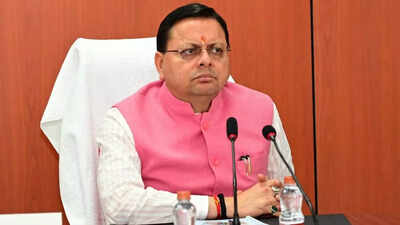
DEHRADUN: Chief Minister Pushkar Singh Dhami on Monday said space technology is no longer limited to research alone but plays a significant role in communication, agriculture, weather forecasting, disaster management, education, health and infrastructure development. Dhami made the point while speaking at the Space Conference 2025 focused on the role of Himalayan states in achieving the vision of a developed India by 2047. He congratulated ISRO and all scientists participating in the event for Indian scientist Shubhanshu Shukla hoisting the national flag at the International Space Station, calling it a matter of immense national pride. Shukla's contribution will lay a solid foundation for future space missions including Gaganyaan, Dhami said. The chief minister also inaugurated a dashboard developed by ISRO and UCOST to make Champawat a model district and also unveiled a publication by ISRO. He spoke about the state government's strong commitment to promoting science and technological innovation, mentioning that significant progress is being made in establishing Science City, Innovation Centers, and cutting-edge laboratories in areas such as AI, robotics, and drones.
He expressed confidence that this conference would play a key role in making Uttarakhand a "space-technology friendly state", contributing to its sustainable development. ISRO Chairman V Narayanan who was the chief guest of the event highlighted the strides taken by India over the years in space technology. "India launched its first rocket in 1963. Since then, India has launched over 100 rockets. Until 1975, India had no satellites of its own, but today, it possesses 131 satellites.
Satellites are playing a vital role in sectors such as TV broadcasting and communication," he said. Narayanan said ISRO is currently working on a human space programme and a rocket capable of launching payloads up to 75,000 kg into low Earth orbit which is expected to be completed in around 27 days. He recalled how Indian rockets were once transported on bicycles, but India holds multiple world records. "India was the first country to detect the presence of water molecules on the Moon, the first to land on the Moon's South Pole, and the fourth to study the Sun with Aditya-L1.
India also succeeded in its first attempt at reaching Mars' orbit, becoming the fourth country to do so. The country aims to establish its own space station by 2030 and send astronauts to the Moon by 2040," he said. He affirmed that under Prime Minister Narendra Modi's leadership, India is achieving new milestones and will certainly become a Developed India by 2047.
Director of the National Remote Sensing Centre, Prakash Chauhan, said satellite data is now integral to our daily lives.
In Uttarakhand, livestock data has been digitized. During the Rishiganga-Chamoli disaster, satellite-based mapping and data were used in national-level policymaking and Post Disaster Need Assessment (PDNA). He emphasised how Earth Observation, satellite communication, and navigation have transformed lives. In Uttarakhand, satellite data is being used for disaster response, forest conservation, forest fire mapping, glacier lake monitoring, and prediction of cloudbursts and floods.

 6 hours ago
49
6 hours ago
49




























 English (US)
English (US)